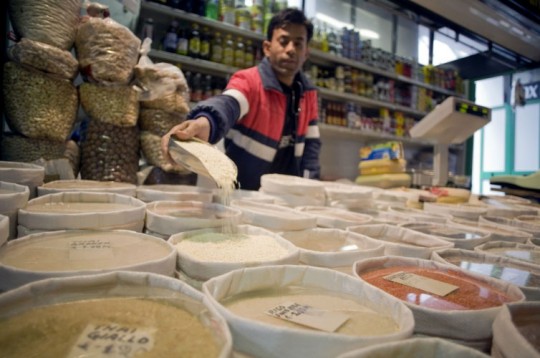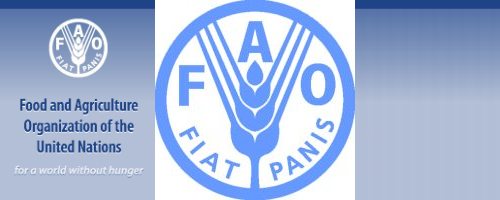Food prices remain steady during November, UN agency reports
Food prices remain steady during November, UN agency reports

Global food prices in November were virtually unchanged from October, and 10 per cent below their peak in February, the United Nations Food and Agriculture Organization (FAO) reported today.
FAO’s Food Price Index level was 215 points last month – just two points, or one per cent, above its level in November 2010, according to a news release issued by the Rome-based agency.
Cereal prices dropped by 3 points, or 1 per cent, from October. This is due largely to wheat prices, which dropped 3 per cent, while rice prices fell only slightly and coarse grain prices remained virtually unchanged.Cereal prices dropped by 3 points, or 1 per cent, from October.
Also a factor is the “significant upward revision” of the 2011/2012 global cereal supply estimate as a result of better crop prospects in some Asian countries and Russia, and larger than anticipated stocks in the latter.
Other factors include deteriorating world economic prospects and a strong United States dollar, according to the latest issue of FAO’s quarterly Crop Prospects and Food Situation report published today.
The report confirmed a record level of world cereal production of 2,323 million tonnes for 2011, which should be enough to cover the expected increase in demand in 2011/12 and also allow for a moderate replenishment of world reserves.
Global wheat output is expected to increase by 6.5 per cent, while the forecasts for coarse grains and rice were reduced slightly due to a downward adjustment for maize in the US and a deterioration of rice prospects in Indonesia.
The report focuses on developments affecting the food situation of developing countries and in particular low-income food-deficit countries (LIFDCs). It said that given their likely increased import requirements, the aggregate cereal import bill of the LIFDCs for 2011/2012 would reach a record level of $33 billion – up 3.4 per cent from 2010/2011.
It also pointed out that, despite some improvements in Somalia thanks to substantial humanitarian assistance and favourable rains, food insecurity is expected to remain “critical” in drought-affected areas until the harvest of short-season crops in early 2012. In the Horn of Africa as a whole, food insecurity remained critical for some 18 million people.
In several countries of the Sahel, including Burkina Faso, Chad, Mali, Mauritania and Niger, agricultural production has been hit by irregular rains and significant pest infestations, all of which could lead to price rises and food insecurity.
The report added that prolonged civil unrest in Syria and Yemen has disrupted trade and humanitarian aid distribution, limiting access to food, especially for vulnerable households.
According to FAO’s latest estimates, 33 countries around the world are in need of external assistance as a result of crop failures, conflict or insecurity, natural disasters and high domestic food prices.
###
> UN Food and Agriculture Organization (FAO).
The Food and Agriculture Organization of the United Nations (FAO) is an intergovernmental organization and has 191 Member Nations, two associate members and one member organization, the European Union. Achieving food security for all is at the heart of FAO’s efforts – to make sure people have regular access to enough high-quality food to lead active, healthy lives.

FAO’s mandate is to raise levels of nutrition, improve agricultural productivity, better the lives of rural populations and contribute to the growth of the world economy.
The Food and Agriculture Organization of the United Nations (FAO) is working with its Members and the entire international community for achievement of the Millennium Development Goals.
These eight goals – each with specific targets and indicators – are based on the United Nations Millennium Declaration, signed by world leaders in September 2000. They commit the international community to combating poverty, hunger, disease, illiteracy, environmental degradation, and discrimination against women.
![]()
The eight Millennium Development Goals are:
Goal 1: Eradicate extreme poverty and hunger
Goal 2: Achieve universal primary education
Goal 3: Promote gender equality and empower women
Goal 4: Reduce child mortality
Goal 5: Improve maternal health
Goal 6: Combat HIV/AIDS, malaria and other diseases
Goal 7: Ensure environmental sustainability
Goal 8: Develop a Global Partnership for Development
* More information at UN Food and Agriculture Organization (FAO)
###
> United Nations (UN).
 The United Nations was established on 24 October 1945 by 51 countries committed to preserving peace through international cooperation and collective security. Today, nearly every nation in the world belongs to the UN: membership totals 192 countries.
The United Nations was established on 24 October 1945 by 51 countries committed to preserving peace through international cooperation and collective security. Today, nearly every nation in the world belongs to the UN: membership totals 192 countries.
When States become Members of the United Nations, they agree to accept the obligations of the UN Charter, an international treaty that sets out basic principles of international relations. According to the Charter, the UN has four purposes:
- to maintain international peace and security;
- to develop friendly relations among nations;
- to cooperate in solving international problems and in promoting respect for human rights;
- and to be a centre for harmonizing the actions of nations.
###
* The above story is adapted from materials provided by United Nations (UN)
** More information at United Nations (UN)





















